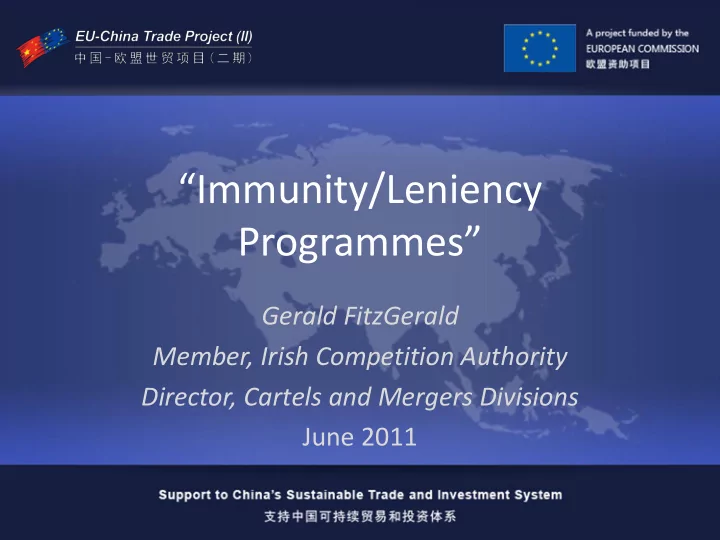

“Immunity/Leniency Programmes” Gerald FitzGerald Member, Irish Competition Authority Director, Cartels and Mergers Divisions June 2011
What is a Cartel? Agreement/understanding between competitors to restrict competition Normally secret; often involve “enforcement” by the cartel (policing, fines for breaches) Examples of cartel arrangements: o Price-fixing o Market-sharing o Bid-rigging
Result of Cartel Activity? Less innovation Less choice Higher prices
Detecting and investigating cartels Secrecy makes detection difficult Evidence essential for decisions to be taken in specific cases Immunity/leniency programmes a key mechanism for detecting cartels and gathering evidence
Immunity/leniency programmes: objectives and means Objective is to create a strong incentive to apply for immunity/leniency The means involves a combination of elements: o Effective enforcement: good detection record and significant sanctions o A programme that creates strong incentives for cartel participants to apply
Key elements of a successful immunity/leniency programme Simple: minimal pre-conditions Limited availability: “the race for immunity” Clear rules (procedures; post-grant conditions; continuing incentives to cooperate)
The Programme: Preliminary Issues (1) Immunity/Leniency distinction: o Immunity: full exoneration from all sanctions; normally only available to first applicant o Leniency: reduced sanctions for second (and possibly subsequent) applicants
The Programme: Preliminary Issues (2) No one model: needs to be adapted to the legal regime in the particular country. Relevant factors include: o Are sanctions imposed by the agency or by the courts? o In the latter case, does the agency itself prosecute or is prosecution undertaken by an independent prosecutor? o Does the legal regime allow for plea-bargaining?
Outline of typical programme (1) Initial approach: confidential; by lawyer; anonymous → “marker” Duration of marker; need for flexibility “Perfecting” the marker – what is required? o Identity of applicant(s), products and territory o Nature of conduct o Duration o Normally, identity of other cartel participants o In some Programmes, acknowledgement of illegality o Undertaking to cooperate
Outline of typical programme (2) Possible grounds for exclusion: o Agency investigation already at an advanced stage o Evidence inadequate o Applicant was the coercer
Outline of typical programme (3) Grant of immunity/leniency: by whom? Agency or prosecutor? Scope of grant: companies; individuals; products? o Once granted, o Must normally end involvement in the cartel o Must not tell the other cartel participants of the application o Must not destroy evidence o Must provide, full, complete and continuing cooperation to the agency
Obligation of full and complete cooperation Provide all documentary and other (e.g., phone) evidence Provide witness statements: must be theirs – not prompted by the agency In some regimes, may be possible to provide evidence orally; but may provide only limited protection against disclosure Give evidence at trial if there is one
Outline of typical programme (4) Revocation of grant: o Failure to cooperate Necessary as an incentive to cooperate, but must be used sparingly – could undermine the Programme
International cartels In some countries, a very large percentage of immunity/leniency applications relate to international cartels The applicant is seeking immunity or leniency in several jurisdictions simultaneously
International cooperation Cooperation with other agencies may be helpful, but laws and ethical rules relating to confidentiality may make this difficult; it may be possible to get a waiver of confidentiality from the applicant in such cases But there may be concerns about the protection of confidentiality in some countries; where such protection is weak, it may not be appropriate to share information
Existing models USA, Canada, UK, Ireland: hardcore cartels are criminal offences but Immunity/Leniency Programmes not all the same European Commission: Leniency Programme is a protection against (significant) administrative fines on companies (not individuals) Europe: ECN Model Leniency Programme – designed for enforcement regimes with civil (not criminal) sanctions against companies
Concluding remarks Immunity/leniency programmes - very successful in countries where there are significant penalties for cartel activity o particularly the risk of imprisonment for individuals Only one element in the cartel enforcement toolkit - but a very important one!
Recommend
More recommend